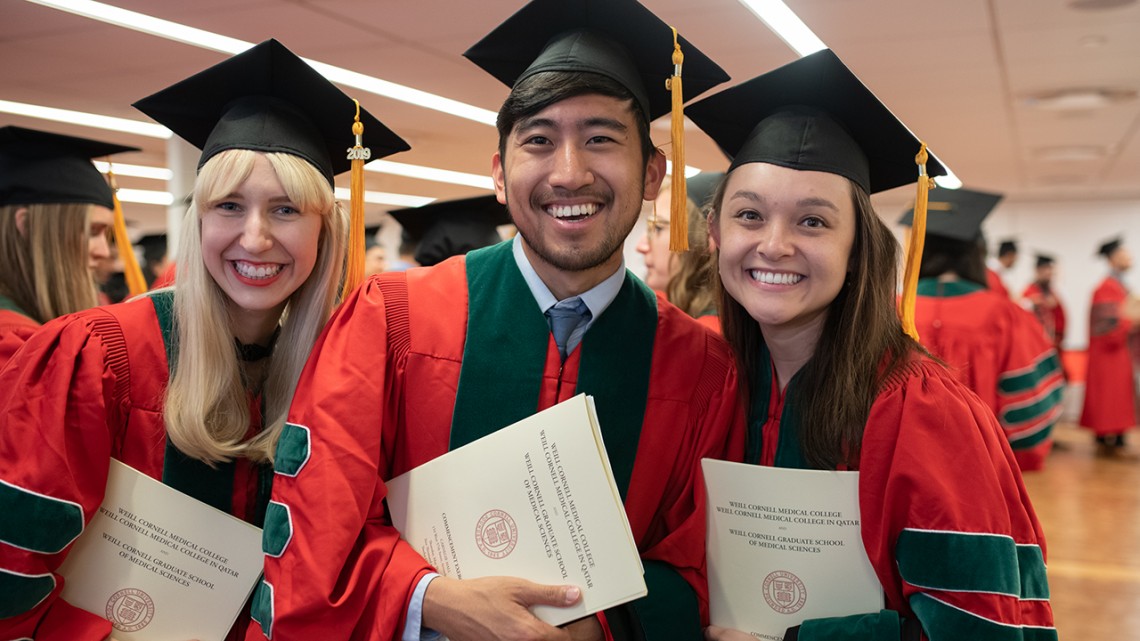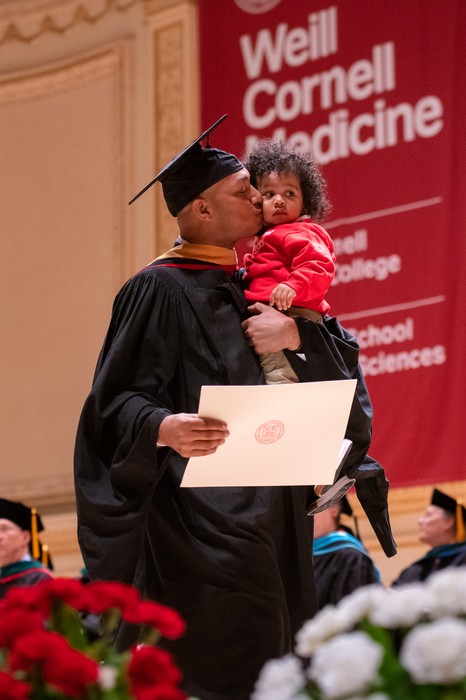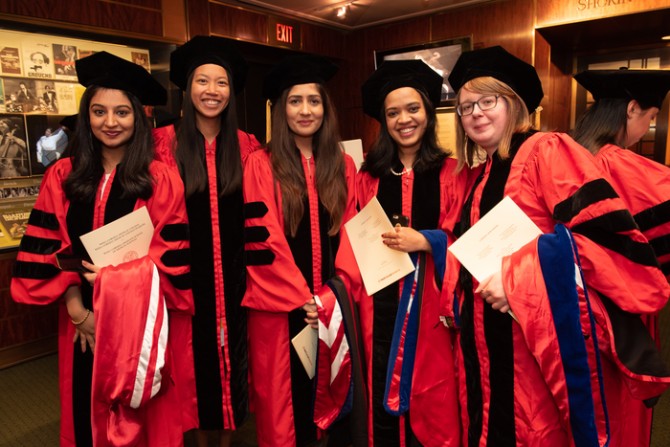
Graduates from Weill Cornell Medical College pose backstage before the Commencement ceremony on May 30. From left, Drs. Olivia Sutton, Brandon Sumida and Lauren Tufts.
Weill Cornell commencement celebrates new leaders in medicine, science
By Kathryn Inman Jamie Kass Alyssa Sunkin-Strube
Dr. Rachel Orleans has achieved a number of firsts in her family. She was the first to graduate from college, the first to earn a Master in Public Health and now, with her graduation May 30 from Weill Cornell Medical College, the first to become a doctor.
“So this is a big deal to us,” said the 31-year-old Ghana native, whose family now lives in Oklahoma. “Graduating today means everything. It’s the culmination of a journey and the sacrifice my family and I have put in to get to this point.”
Passionate about helping those who – like her – come from disadvantaged backgrounds, Orleans will head to the University of Colorado in Denver for a residency in dermatology, where she will combine her interests in public health and medicine.
Orleans was among 371 students – 95 fellow medical doctors from New York and 49 from Qatar; 76 Ph.D.s; 31 physician assistants; and 120 with Master of Science degrees – in the Class of 2019 who graduated from Weill Cornell Medicine.
The 2019 Commencement ceremony at Carnegie Hall was also a milestone for the Executive M.B.A./M.S. in Healthcare Leadership program, offered jointly by the Weill Cornell Graduate School of Medical Sciences and Cornell’s Samuel Curtis Johnson Graduate School of Management, as it graduated its first class of 39 students.
Vibrant red and white bouquets lined the stage as Cornell President Martha E. Pollack joined deans Dr. Augustine M.K. Choi, Dr. Barbara Hempstead and Javaid I. Sheikh in conferring degrees on students graduating from Weill Cornell Medical College, Weill Cornell Graduate School of Medical Sciences and Weill Cornell Medicine-Qatar, respectively.
With the first phase of their medical education behind them, the graduates will now embark on their residencies, postdocs, fellowships and other stages of their careers. These new physicians and scientists will be on the front lines of society’s most urgent health care challenges.
“In thinking about the health care challenges we face, it’s clear that there are no easy solutions,” said Choi, the Stephen and Suzanne Weiss Dean of Weill Cornell Medicine, and Cornell’s provost for medical affairs. “Yet I feel strongly that as graduates of Weill Cornell Medicine, you have the ability to make an impact on this complex world we live in. It’s in your DNA.”
Indeed, the drive to give back to humanity is a distinguishing characteristic of Cornellians that traces its roots to the university’s founding, Pollack said.
“As graduates of Weill Cornell Medicine,” she said, “the good that you will do will affect others in ways that are not abstract, but concrete; not theoretical, but exquisitely and profoundly human, as you work to enhance human health and well-being.”
And while this work carries great responsibility, the graduates will also find it personally rewarding, Hempstead said.
“You’ve shown us that being the first to explain a scientific mystery brings enormous fulfillment; that these ‘aha’ moments are what drive us, entice us and tantalize us as scientists,” she said. “Through you, and your accomplishments to date, we know that prospects for scientific discovery are limitless.”
As they move on to the next chapter in their lives, graduate school commencement speaker Georgia Frost, Ph.D. ’19, urged her classmates to remember the value of the scientific method – asking questions and forming, challenging and refining a hypothesis – and the lessons they gleaned from it.
“With this process we developed perseverance and resilience, creativity, logical reasoning and a healthy dose of skepticism,” said Frost, who will conduct her postdoctoral research at Weill Cornell Medicine studying Alzheimer’s disease. “We learned that collaboration and teamwork are critical to scientific progress and that our research is only impactful if we are able to effectively communicate with others.”
Communicating with others also means treating others with dignity and respect, and celebrating diversity.
“I urge you all to actively make the environment around you more acceptable to each and every individual regardless of their age, race, gender, religion, sexual orientation – or even views on sports,” graduating Weill Cornell Medicine-Qatar commencement speaker Dr. Merna Hussien said, drawing laughter. Hussien will complete her residency in internal medicine at Johns Hopkins Medicine.
“Build bridges of conversation,” she said, “try to understand one another and, most importantly, remember where you have started your journey and those who have helped you pave the way to your own success.”
These are essential values that must guide the graduates wherever and whatever they do next. Sheikh is certain that they will rise to the challenge.
“Everyone at WCM-Q is confident that these new doctors will be wonderful ambassadors for the college, for Qatar Foundation and for the entire nation,” Sheikh said during that institution’s commencement on May 8, “demonstrating Qatar’s commitment to unlocking human potential to the whole world.”
Just as important is to have a strong sense of social justice and to drive change locally, regionally and around the world, said graduating medical school commencement speaker Dr. Lynne Rosenberg.
“Here we come, a generation of doers, of people who are willing to stand up for change, stand up for their patients and the communities they serve, and take health care beyond the walls of a hospital,” Rosenberg said. “I could not be more proud to be a part of the graduating class of 2019, because you are moving mountains, friends, and the world had better be ready for us.”
Kathryn Inman is associate editor, Jamie Kass is a science writer and Alyssa Sunkin-Strube is newsroom manager for Weill Cornell Medicine.
Media Contact
Get Cornell news delivered right to your inbox.
Subscribe





